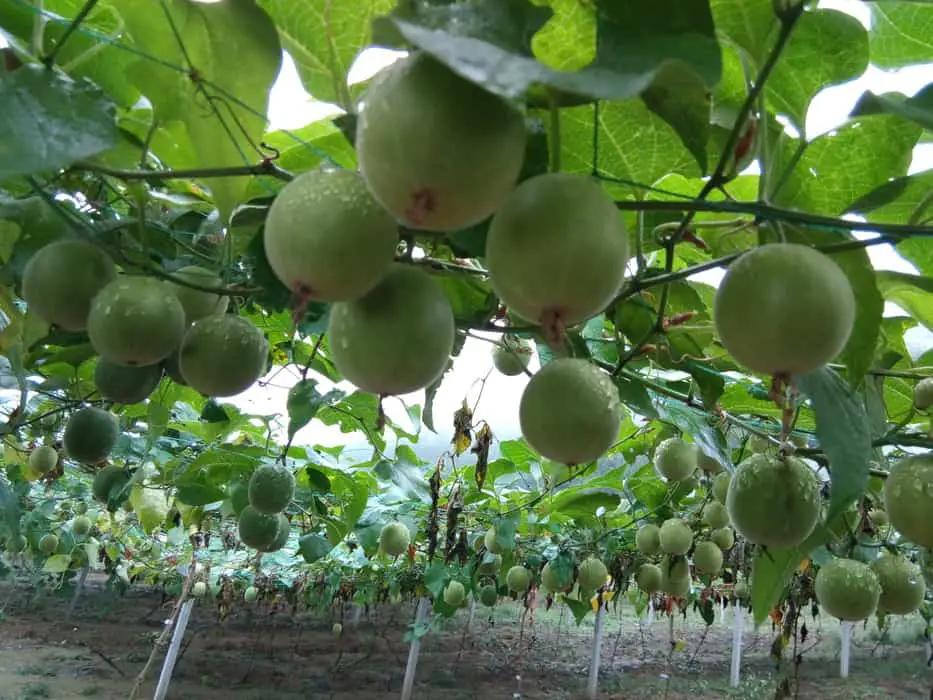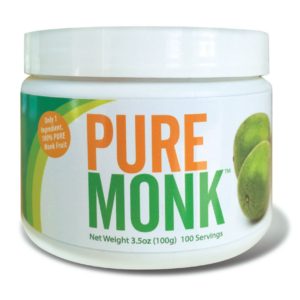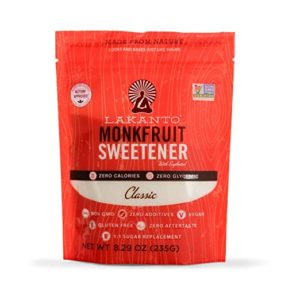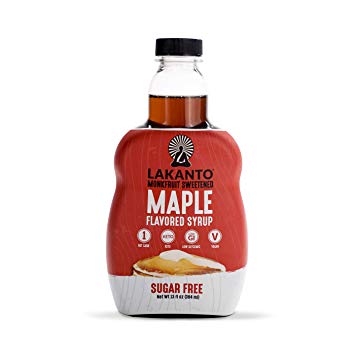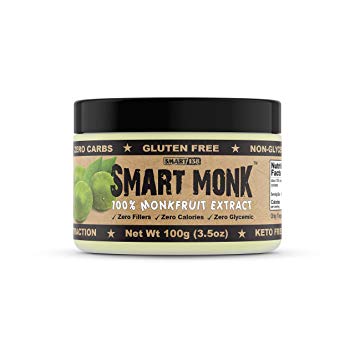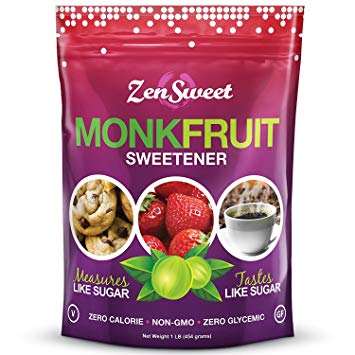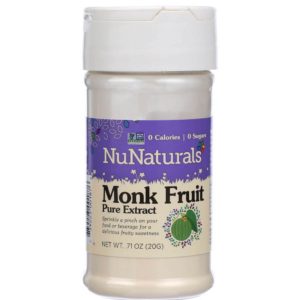For those who are already familiar with the ketogenic diet, it’s obvious that sugar is a big restriction when it comes to staying in ketosis. The way sugar interacts with carbohydrates is so powerful, that even the slightest amount can completely pull you out of ketosis, and pause or even cease your body’s ability to burn fat as rapidly.
Sugar also does more harm than just threaten your state of ketosis. Sugar consumption has been linked to metabolic syndrome, type-2 diabetes, chronic inflammation, insulin resistance, and obesity.
But without sweets, we’d all go a little bit crazy, right? So the question becomes, how do we get our sweet craving fix without eating any sugar?
There are a variety of sugar substitutes and sweeteners that still work within the confines of the keto diet, but not all of them are optimal, as they can have drawbacks when it comes to digestion and side effects. One of the most effective keto-friendly sweeteners that I’ve encountered comes in the form of the Monk Fruit.
What Is Monk Fruit?
The Monk Fruit, which is also often referred to as Luo Han Gao, is a plant that belongs to the Cucurbitaceae family of fruits. Native to China and parts of Thailand, the monk fruit is a small green gourd, similar to that of a melon, which was colloquially named after the monks that traditionally cultivated it. It was brought into the United States first in the early twentieth century by the National Geographic Society.
The monk fruit was originally used as a way to treat the common cold, nausea, and other digestive issues within Eastern medicine. But today it’s most commonly used to sweeten up recipes without using sugar.
More importantly for this topic, monk fruit sweeteners are extracted by removing the seeds and skin of the fruit, crushing up the pulp, and straining out a resulting juice. The juice of the monk fruit is sweet but also contains zero calories, making it a great additive for those on low sugar diets.
So how does monk fruit juice stack up to sugar? Is it sweet enough?
The answer is not only a resounding YES, but in fact it’s roughly 100-250 times sweeter than sugar! This means that just a little bit of the fruit juice can go a long way when it comes to supplementing a dish to give it a sweeter flavor profile.
While it might not be that recognizable to most westerners, monk fruit and monk fruit sweeteners are also safe and healthy food options, approved by the FDA, and are Generally Recognized as Safe in the United States for all people, including children, the elderly, those with diabetes, and pregnant women.
Monk fruit extract can also be manufactured through a few different methods. The most common one includes boiling the fresh fruit and immediately drying it, resulting in a powder-like substance similar to stevia, which can be easily added into most dishes, smoothies, and shakes. This extraction focuses on the fruit’s “mogrosides“, which are the main chemicals within the plant that account for sweetness. Additionally, monk fruit has no after taste, which is why it’s particularly popular compared to other sweetener alternatives that are out there.
You may have even eaten monk fruit before without even realizing it, because it’s used as a sweetener substitute in a lot of popular products, including yogurts, beverages, baked goods, candies, and sauces. It often appears under the following branding names: NectresseTM, PurefruitTM, and Fruit-Sweetness.
Is Monk Fruit Keto Friendly?
Because it contains no sugar or carbohydrates, and because it doesn’t have any affect on your blood glucose levels monk fruit and all monk fruit extracts are completely keto friendly.
In addition to all of it’s health benefits (we’ll get to the specifics later in this article), monk fruit extract also has no calories, making it an incredibly effective way to sweeten your meals without needing to spend more time at the gym or cutting down on other food groups.
You do not need to show any sort of restraint or measurement when it comes to eating monk fruit, however it’s important to note that pre-packaged goods that contain monk fruit might still not be keto friendly, so always check for sugars and carbohydrates on all nutrition facts labels. One of the big things to keep an eye out for is dextrose or maltodextrin, which have been found in some products advertised with monk fruit extract. While trace amounts of these ingredients won’t always take you out of ketosis, they do pose a risk depending on your serving size.
Some keto-friendly monk fruit sweeteners that I like to use include:
Pure Monk
Pure Monk™ (Monk Fruit or Lou Han Guo) powder is a 100% pure, all-natural, virtually no-calorie sugar substitute, that is derived from real fruit. Pure Monk™ is a natural, healthy, keto-friendly, flavorful alternative to table sugar and unhealthy chemical sweeteners such as aspartame. Also known as lo han guo, this fruit extract delivers a clean, sweet flavor, with no aftertaste. You can pick up Pure Monk™ on Amazon.com.
Lakanto Monk Fruit Sweetener
Lakanto Monk Fruit Sweetener is a great one to one sugar replacement that has the best consistency for replacing sugar in baking and cooking. Lakanto Monk Sweetener is perfectly keto friendly, and comes with no artificial flavoring or added sugars.
Lakanto Monk Fruit Maple Syrup
Lakanto Maple Flavored Syrup is a great, sugar free option for flavoring your favorite keto-friendly breakfasts and snacks. It tastes, smells, and looks like real maple syrup, and has the correct consistency to be used just like real maple syrup, without taking you out of ketosis. You can use it in baking, coffee, tea, and on pancakes, oatmeal, yogurt, and bacon. You can pick up yours today from Amazon.com
Smart Monk – 100% Fruit Extract
Smart Monk is made from 100% monk fruit etract, with no junk and no fillers. Coming in at zero calories, zero carbohydrates, and zero glycemic, it also is nearly 150-200x sweeter than table sugar, so using just a pinch (1/32 table spoon) can go a long way when it comes to sweetening your morning coffee or tea, or when used in any keto-friendly baked goods. You can pick up yours for a low price usually over at Amazon.com
ZenSweet Monk Fruit Sweetener
ZenSweet sweetener is one of the most affordable variants of monk fruit sweetener on the market today. It’s diluted enough to measure just like sugar, but is still zero calorie, zero carb, and zero glycemic, making it perfectly keto friendly. Click here to check out ZenSweet.
NuNaturals Monk Fruit Extract Powder
NuNaturals Monk Fruit Extract Powder is insanely powerful. It contains zero calories and will help you cut sugar out of your diet entirely. It is even more concentrated than most other extracts on the market, coming in at 300 times the sweetness as sugar, so definitely use sparingly when adding to your foods and drinks. You can check out NuNaturals for its lowest price over at Amazon.com
Benefits of Monk Fruit
What makes monk fruit stand out from all other sweeteners is the crazy amount of benefits that come with it. Not only does it substitute sugar and make a lot of dishes more keto friendly, but it also helps processes in other parts of your body. Let’s break down some of the biggest benefits of monk fruit:
1. It Can Be Used to Treat Inflammation
The ancient Chinese were especially fond of monk fruit for it’s anti-inflammatory properties. This fruit was able to help with symptoms of inflammation such as fevers and heat stroke. On top of that, a study from 2011 also determined that monk fruit was a great tool to fight off phlegm and relieve sore throats.
2. Decreases Risk of Diabetes
Monk fruit has been used as a method to fight off symptoms of pre-diabetes in China for centuries. Recent studies show that monk fruit is incredibly effective at reducing glucose levels in the blood, while at the same time promoting the production and release of insulin in the pancreas.
Furthermore, those mogrosides that are found in monk fruit also contribute to relieving diabetic symptoms such as frequent thirst and fatigue.
3. Fights Off Infection
This fruit contains a set of powerful anti-infection properties, primarily in the way that it inhibits the growth of certain bacteria that are common in most forms of infection. In particular, it is a great defense against oral bacteria that contributes to ailments such as gingivitis and tooth decay (quite the opposite of how sugar works on the teeth!).
4. Helps Fight Fatigue
A recent study found that monk fruit was deemed successful in helping to decrease fatigue in mice who were consistently exercising. The study showed that mice who were given the extract were able to exercise for longer periods of time compared to those who weren’t consuming monk fruit.
5. Reduces the Overall Risk of Obesity
The overconsumption of sugar, especially in United States, Canada, Mexico, and the United Kingdom as of late has been an epidemic when it comes to health, especially among children. Diagnoses of metabolic syndrome, prediabetes, and obesity have never been higher, and our obsession with added sugar in almost all prepackaged foods.
Using monk fruit as a zero calorie sugar alternative is a powerful way to cut out sugar completely from one’s diet, which can significantly reduce the overall risk of obesity.
6. Relieves Symptoms of Allergies
Typically when we experience an allergic reaction to stimuli, our bodies release a flood of chemicals to try and combat the allergens. The main chemical in this reaction is known as histamine. The histamine chemical is responsible for recognizable allergy symptoms such as coughing, sneezing, and itching.
When consuming monk extract consistently, it has been proven to reduce the release of histamine, and has also shown to reduce asthmatic reactions.
7. Helps Prevent Cancer
Monk fruit is full of antioxidants, which are extremely beneficial for reducing cancer rates. Not only is there a strong correlation between antioxidants and decreased cancer, but a recent study backs up this claim by concluding that mogroside V has the ability to inhibit the progression of pancreatic cancer cells in mice. Another study found that monk fruit was effective in inhibiting the growth of cancer in the throat and colon.
8. It Can Help Your Sleep
Sugar has been heavily connected to spiking your brain activity and can keep you up for hours later than you intend. It also has physiological affects that can diminish the quality of your sleep, resulting in more junk sleep that can hurt your productivity, ability to concentrate, and even your body’s efficiency at metabolizing foods – which can cause you to gain weight! One of the best things about cutting out sugar and using a keto-friendly sweetener is that added benefit of reducing insomnia.
Downsides and Side Effects of Monk Fruit
While monk fruit seems almost too good to be true, it does come with some minor drawbacks. Fortunately there are no known side effects of consuming monk fruit (outside of rare allergic reactions). For the most part, these downsides are purely circumstantial, and will likely depend on where you live in the world. Some of the most prominent cons of monk fruit include:
1. It is difficult to find
2. It can be more expensive than table sugar and other sugar-free sweeteners
3. Many food products that contain monk fruit also have added sugars
4. It can cause digestive issues in large quantities
5. Some people can experience allergic reactions to monk fruit
What Foods Can Monk Fruit be Added to?

There are many ways to use monk fruit extract as a keto-friendly sweetener. Pretty much anything that typically is complemented by sugar, can also be complemented by this extract as a substitute.
Here are some examples of the way I like to use monk fruit extract:
- Coffee
- Tea
- Smoothies
- Shakes
- Nuts
- Baked Goods (Keto Desserts!)
- Sauces
- Yogurts
- Salad Dressings
- Oatmeal
- Ice Cream
How Does Monk Fruit Compare to Other Sweeteners?
Monk Fruit vs Stevia
Monk fruit is actually most similar to stevia than all other sugar-free sweeteners. Both of these sweeteners contain no carbs, calories, or sugar, making them both keto friendly. Both also come from a natural source (in stevia’s case, it comes from the stevia leaf). They are also both great options for keto-friendly coffees, teas, and baked goods because they are both heat stable.
However what makes me like monk fruit a little bit more, is that monk fruit comes with fewer side effects than stevia. Stevia has been shown to cause indigestion and generalized discomfort, including bloating, nausea, and heartburn.
Monk Fruit vs Erythritol
When it comes to erythritol, the big differentiator is that it doesn’t have any affect on blood glucose levels. This can be seen as a positive or a negative depending on your circumstance, but in my experience, most dieters (outside of high intensity athletes) benefit from the lower blood glucose levels that come from eating monk fruit.
Monk Fruit vs Aspartame
Aspartame is a very popular sweetener, but it probably comes with the most negative side effects among all of them. Aspartame is found within a lot of popular products such as diet sodas, sugar-free ice cream, and gum. However the biggest side effects include: seizures, headaches, depression, dizziness, and weight gain, which is obviously counterproductive to the keto diet in general.
Monk Fruit vs Xylitol
Xylitol is a solid artificial sweetener. It also has little effect on blood glucose levels, and has few side effects. One of the bigger drawbacks is that it isn’t has heat stable as monk fruit, making it harder to make baked goods and use it in all types of coffees and teas.

